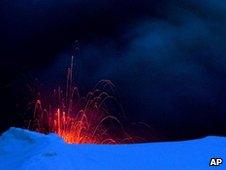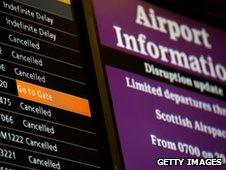Why volcanic ash from Iceland stops planes flying in UK
- Published

A new volcanic ash cloud spreading towards the UK is creating uncertainty
Planes have started flying over parts of Britain again but the only airports open so far are in Scotland and Newcastle and even they may not be in business for long.
It's because a new ash cloud is heading our way from Iceland after the eruption of a volcano under the Eyjafjallajokull glacier.
Glasgow airport was open until 12pm (20 April) with a few planes taking off, mostly on services to the Highlands and Islands, but services are now suspended again.
Planes have also been taking off from Aberdeen, Edinburgh and the Isle of Man.
In England, Newcastle Airport is open but again with very few flights and Northern Ireland's Belfast City Airport is hoping to see services resume.
Manchester and Birmingham say they'll be shut until at least 7pm on Tuesday.
Check what's happening at your local airport at BBC Travel News
'Rescue'
Some transatlantic services are back in business, but not to the UK, with thousands of Britons stuck in America including Radio 1's Chris Moyles.
The international terminal at JFK airport in New York looks more like a refugee camp than an airline hub with stranded travellers using camp beds to sleep.
More than a thousand US flights have been cancelled in total but now, with flights resuming, the aim for Brits stranded there is to re-book their journey home as soon as they can.
In all around 150,000 Brits are thought to be stuck abroad.
A new half a billion pound cruise ship, the Celebrity Eclipse, is heading for Bilbao in northern Spain to pick up around 2,000 of them.
HMS Albion has arrived in nearby Santander to collect hundreds of soldiers making their way home from Afghanistan.
Around 200 civilians are also expected to be allowed to hitch a ride home.
Stranded
Some families are taking more drastic action to get back home from their holidays.
Megan and her family spent two days driving from Barcelona to Calais.

"It was actually my 18th birthday on Thursday, so this is definitely an 18th birthday that I'll never forget.
"My coursework was also due in today so I couldn't get back to hand in the final draft. Hopefully my teachers will be understanding otherwise I'll just be kicked off the course."
Sporting fixtures are also being affected by the airspace lockdown with Liverpool being forced to drive 900 miles to Spain to play Atletico Madrid in the Europa League semi-final first leg this Thursday. Fulham are travelling to Hamburg.
In the Champions League Barcelona have driven nearly 700 miles to play Inter Milan with Lyon travelling to Munich.
Sunday's MotoGP race in Motegi, Japan, has been re-arranged for 3 October with doubts over the next Formula 1 race in Spain on 9 May.
This weekend's London marathon will defintiely go ahead but several international runners could miss the race.
Health
But why are flights in the UK and Europe being so badly affected by ash from a volcano in Iceland?
It's because the ash contains tiny particles of rock and even glass, which if they are sucked into a plane can wreck engines.
Paul Haskins is from National Air Traffic Services (Nats): "Volcanic ash poses serious hazards to aircraft. Volcanic ash is quite a fine, abrasive powder and it can be quite damaging to modern jets' engineering and as such we have to restrict aircraft operation in those areas.
"The weather conditions are such that that volcanic ash is blowing southwards across Scotland and the North Sea and down into the Midlands area. Safety obviously is our number one priority.
"Volcanic ash poses a known and serious hazard to aircraft and as such we've had to restrict some aircraft operations in those areas."
The ash isn't thought to pose a risk to people on the ground because it's so high up in the atmosphere - currently between 6,000m (20,000ft) and 11,000m (36,000ft). It's just a danger to planes.
In 1982, British Airways flight nine from London Heathrow to Auckland in New Zealand was forced to land in Indonesia after going through a cloud of ash.
All four engines on the plane failed after the explosion of Mount Galunggung in West Java and the jet glided without power for more than a quarter of an hour before the crew managed to restart three of the four engines.
A Singapore Airlines flight also lost three of its engines after flying through the same ash cloud a month later. Both planes also suffered serious external damage.
The ash cloud hadn't shown up on weather radars because it was still dry and the equipment used can only spot moisture in clouds.
The Geological Survey says volcanic ash is formed from explosive eruptions with particles as hard as a knife blade.
The ash can also melt in the heat of an aircraft engine then solidify again, disrupting the mechanics.

- Published19 April 2010

- Published19 April 2010
